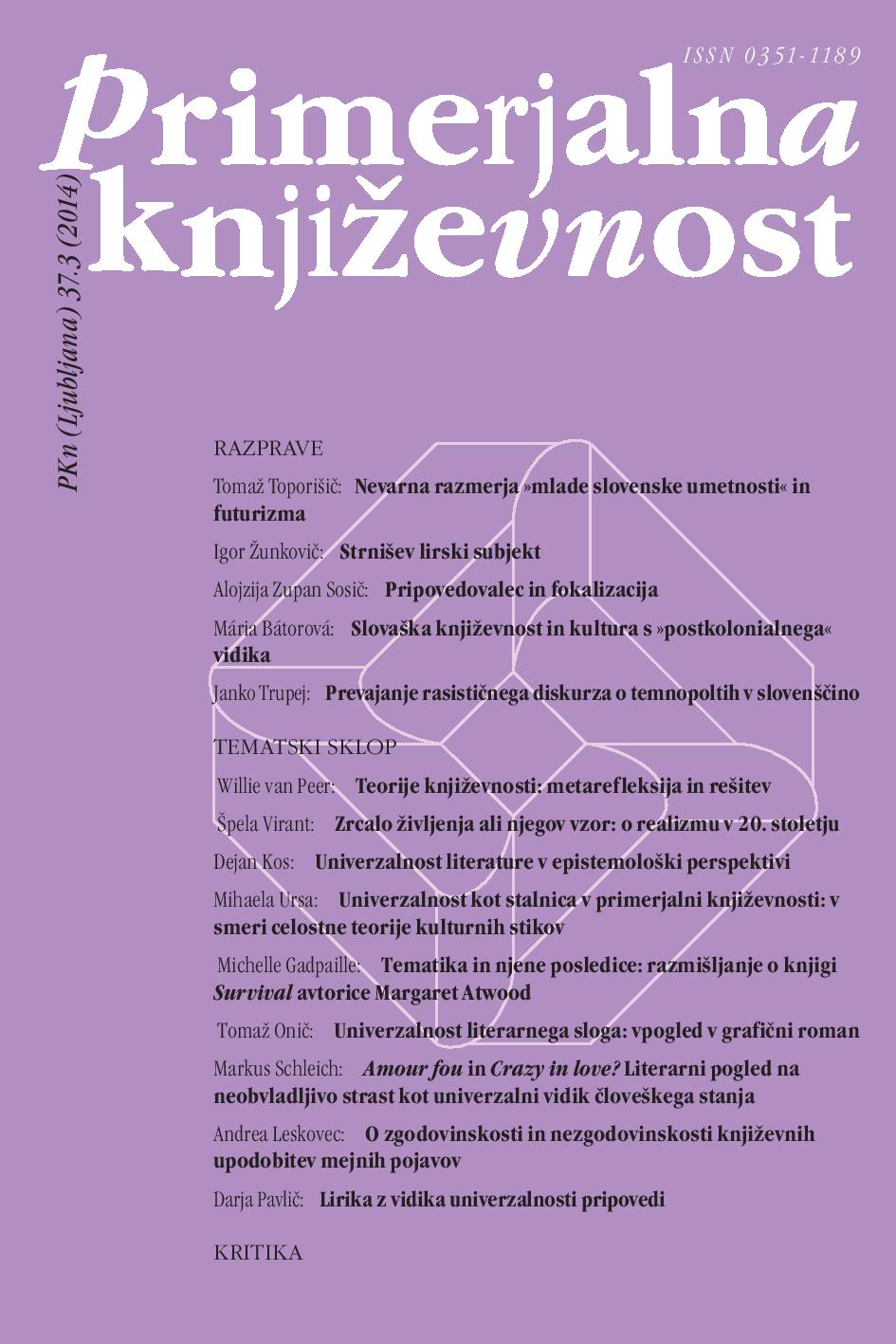Gregor Strniša’s Lyric Subject
Keywords:
Slovenian poetry, lyrical subject, cosmic conscience, Strniša, GregorAbstract
This article discusses the development of the lyric subject in the first five poetry collections by Gregor Strniša, in which the interpretation is based on Strniša’s own poetry, the sources that he knew and used (especially Weizsäcker’s explanation of quantum mechanics from a comparative perspective with Kant’s transcendentalism), and of course his poetological text “Relativnostna pesnitev” (“The Relativity Poem”). – The following proves to be an essential question regarding Strniša’s lyric subject: How can the lyric subject articulate himself (or speak) from the viewpoint of universal consciousness and retain the relative stability of his subjectivity? – Complementarity is the most distinct device of his poetic description of universal consciousness connected with this question (his collections Zvezde [Stars] and Želod [Acorn], as well as Škarje [Scissors] and Jajce [Egg]); in Strniša, this no longer constitutes only the content of poetry, but also a form of it. At the content level, the importance of uncertainty and thus disregard for the rules of traditional logic, especially the rule of the excluded third party, stand out; this makes it possible for Strniša to describe contradictions in a non-contradictory manner (his poem “Brobdingnag”). – It is clear that Strniša adopted the concepts that he used to describe his view of the world from the theories of relativity and quantum mechanics. One must first understand these concepts in order to be fully able to enter his poetic universe. Strniša adopted them appropriately in philosophical terms, but nonetheless in his own sort of way, which the author of this article already discussed in the article “O Gregorju Strniši in sodobni fiziki” (“Gregor Strniša and Modern Physics”). For him, the meaning of the mathematical formula for people’s relationship to the world is more important than the beauty of the formula. This is why the literature can also see that (i.e., meaning) which is inaccessible to the scientific logos (i.e., description, function); this is especially evident from his collection Oko (The Eye). – Poets can articulate the reality of the universe through universal consciousness because they themselves as subjects are already part of a greater or higher whole, or part of the whole of universal consciousness, even though they continue to remain mere subjects. Strniša thus does not succumb to the modernist tendency to negate, surpass, deconstruct, or even destruct the subject, but finds a new and higher firmness of the relative and desubjectivized subject, whose tragedy and predetermination are also defined by universal consciousness. – In his collections Oko, Škarje, and Jajce, universal consciousness is both the narrated and the narrator. People can relate to this because through their self-awareness they themselves are caught in the trap of cyclicity, from which they cannot escape. Strniša’s poetic confrontation with the world – which is both the physical world of his Newtonian reality and a relative and quantum world – ends with the human because poetry is only possible through him. Universal consciousness is expressed through everything that exists, but its wholeness and consciousness can only be comprehended through poetic language. Strniša thus pays a deep and respectful homage to poetry.References
Balžalorsky, Varja. Lirski subjekt (doktorska disertacija). Ljubljana: Filozofska fakulteta, 2009.
Einstein, Albert. The Meaning of Relativity. New Jersey: Princeton University Press, 1998.
Hribar, Tine. »Pesem, ki je ni.« Interpretacije. Ljubljana: Nova revija, 1993. 71–83.
Kant, Immanuel. Kritika čistega uma ¾. Ljubljana: Društvo za teoretsko psihoanalizo, 2011. [= Kritik der reinen Vernunft. Darmstadt: Wissenschaftliche Buchgesellschaft, 1998.]
Kolšek, Peter. »Balade o svetovjih.« Strniša, Gregor. Balade o svetovjih. Izbrane pesmi. Ljubljana: Mladinska knjiga, 1989. 153–169.
Kos, Janko. »’Liliput’ in ’Brobdingnag’.« Interpretacije. Ljubljana: Nova revija, 1993. 62–70.
– – –. Lirika. Ljubljana: DZS, 1993.
Novak, Boris A. »Asonanca pri Strniši.« Interpretacije. Ljubljana: Nova revija, 1993. 122–141.
Pavlič, Darja. Funkcije podobja v poeziji K. Koviča, D. Zajca in G. Strniše. Maribor: Slavistično društvo Maribor, 2003.
Schmidt, Goran. »Vedro piče za metafizične prašiče.« Interpretacije. Ljubljana 1993. 180–191.
Schmidt Snoj, Malina. »Škarje in Jajce kot menipejska satira.« Interpretacije. Ljubljana: Nova revija, 1993. 84–99.
Stanek, Janez. »Srečevanja z Gregorjem Strnišo.« Interpretacije. Ljubljana: Nova revija, 1993. 7–31.
Stenger, Victor. Quantum Gods: Creation, Chaos, and the Search for Cosmic Consciousness. New York: Prometheus Books, 2009.
Strniša, Gregor. Balade o svetovjih. Izbrane pesmi. Ljubljana: Mladinska knjiga, 1989.
– – –. Gregor Strniša. Pesmi. Ljubljana: DZS, 1978.
– – –. Jajce. Maribor: Založba Obzorja, 1975.
– – –. Mozaiki. Koper: Založba Lipa, 1959.
– – –. Odyseusz. Krakov: Zebra, 1993.
– – –. Oko. Ljubljana: Cankarjeva založba, 1974.
– – –. Rhombos. Ljubljana: DZS, 1989.
– – –. Svetovje. Ljubljana: DZS, 1988.
– – –. Škarje. Maribor: Založba Obzorja, 1975a.
– – –. Vesolje. Ljubljana: Cankarjeva založba, 1983.
– – –. Zbrane pesmi. Ljubljana: Študentska založba, 2007.
– – –. Zvezde. Ljubljana: DZS, 1965.
– – –. Želod. Ljubljana: DZS, 1972.
Svetina, Ivo. »Žaba dušica in polž lazar.« Interpretacije. Ljubljana: Nova revija, 1993. 153–165.
Taufer, Veno. »Pesnik kozmične zavesti.« Interpretacije. Ljubljana: Nova revija, 1993. 55–61.
Weinberg, Steven. Sanje o končni teoriji. Nova Gorica: Flamingo, 1996.
Weinbrot, Howard D. Menippean Satire Reconsidered. Baltimore: The Johns Hopkins University Press, 2005.
Weizsäcker von, Friedrich Carl. Zum Weltbild der Physick. Stuttgart: S. Hirzel Verlag, 1970.
Žunkovič, Igor. »Gregor Strniša in sodobna fizika.« Dialogi 43.3–4 (2007): 17–33.


